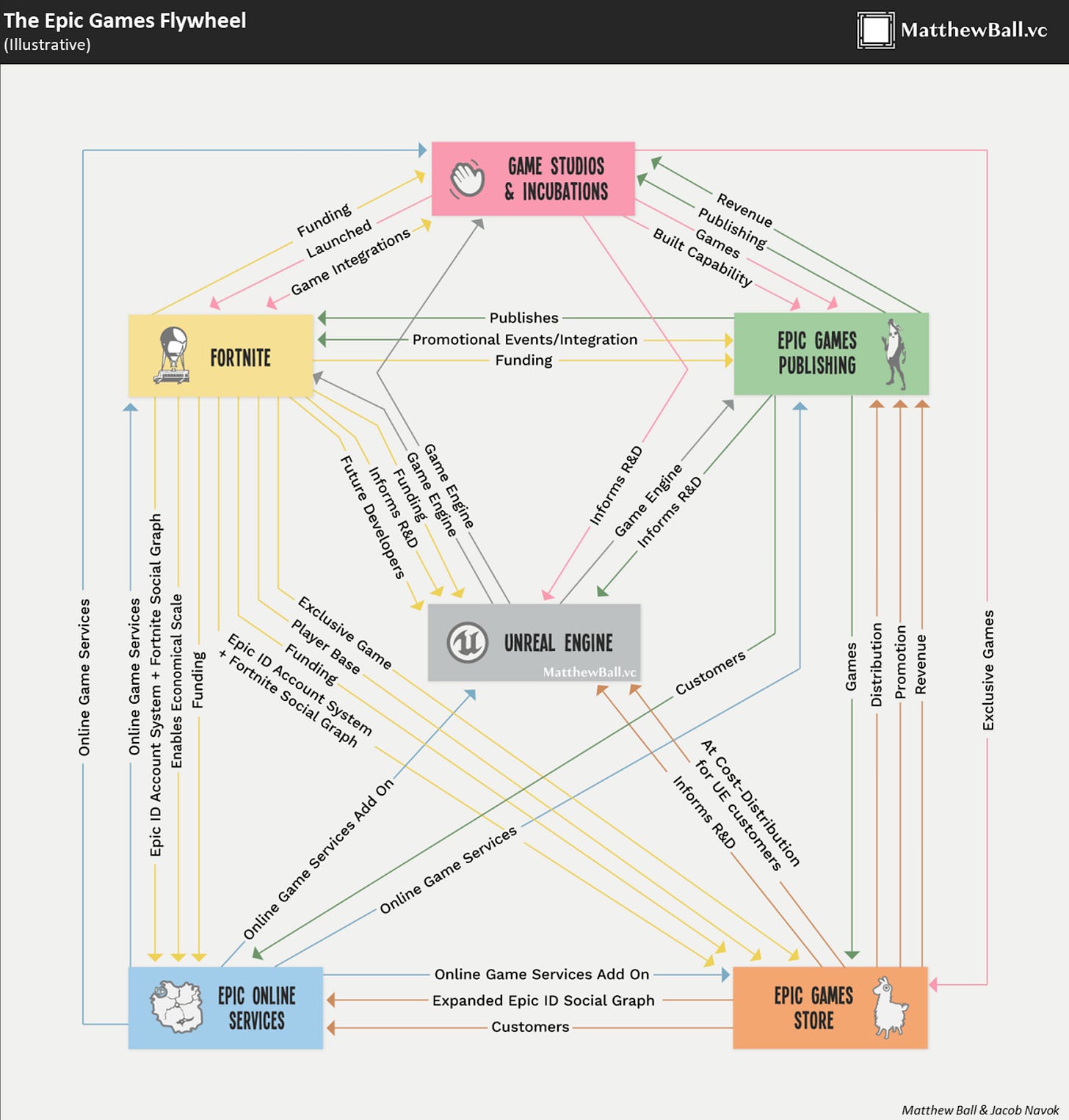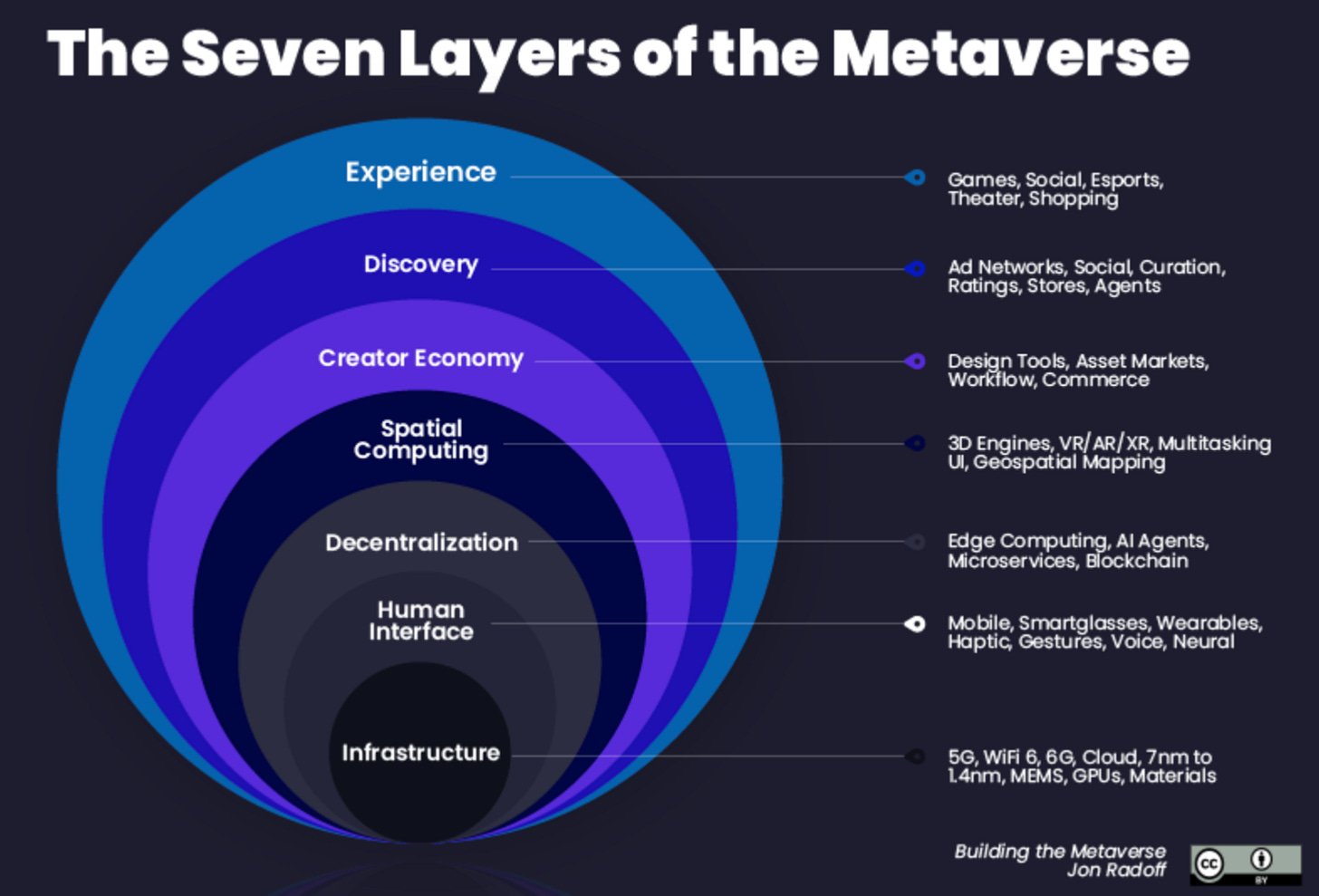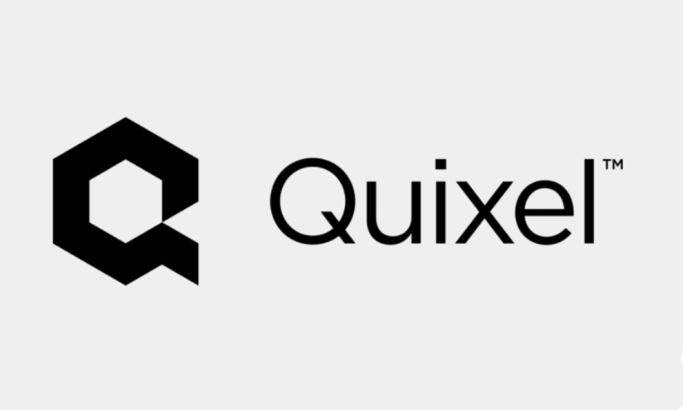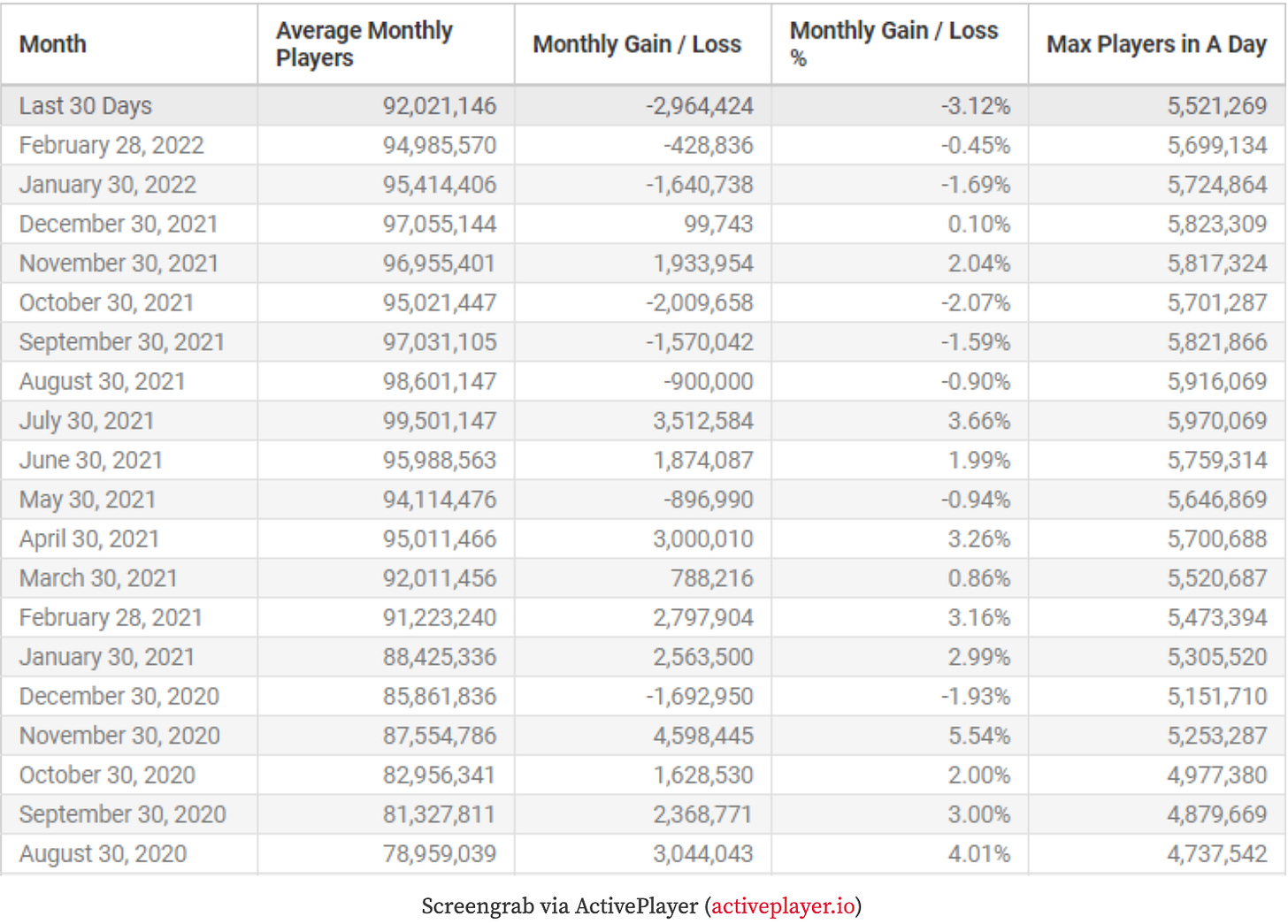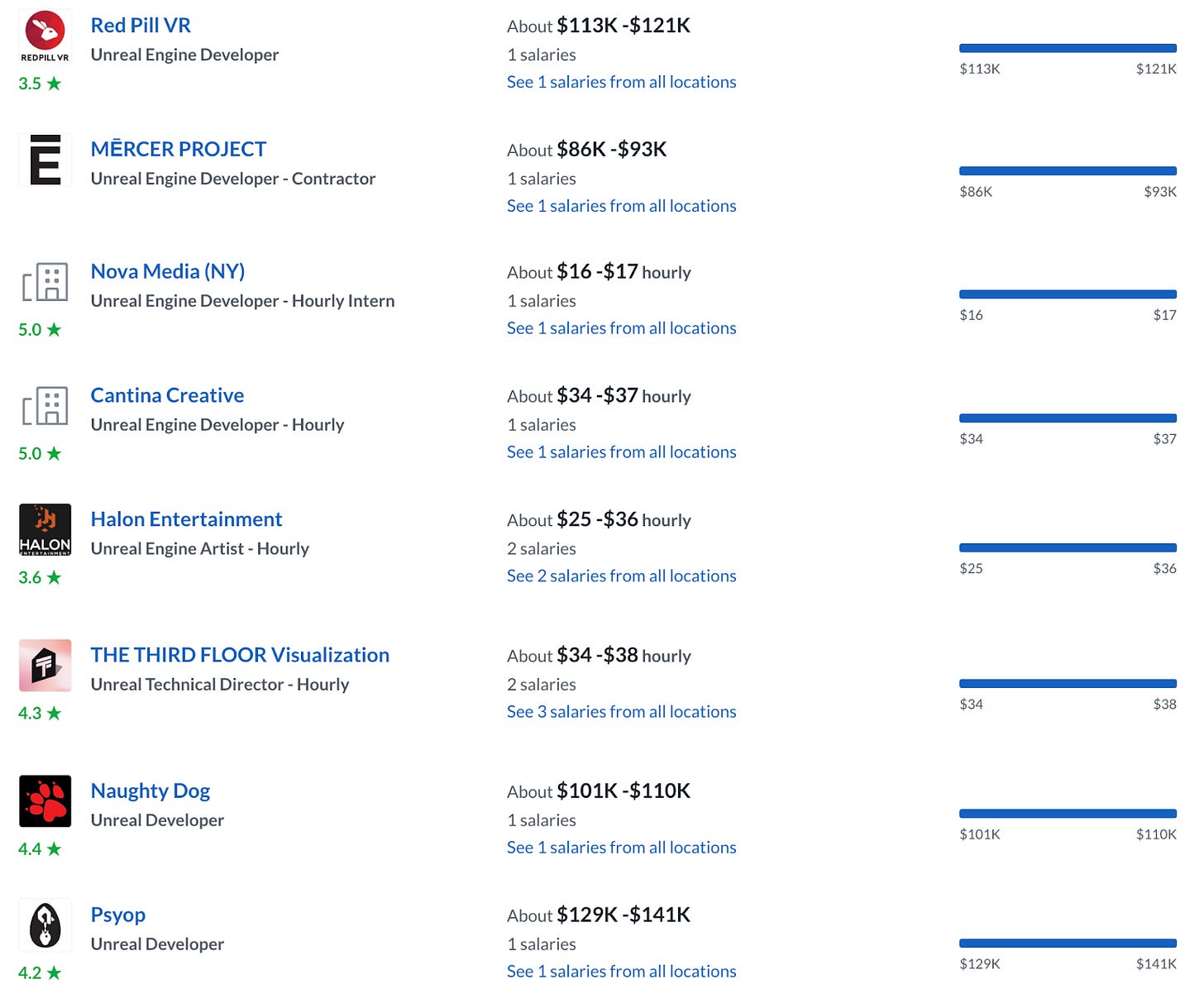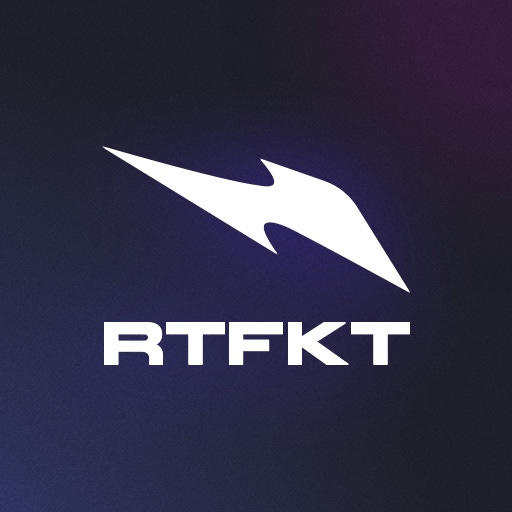Epic Games Is At The Center Of The Metaverse: A look at their assets
The layer 0 technology for gaming and 3D
Statement:
RE3W was not paid by Epic Games to produce, distribute, curate, demonstrate, or advocate for its company. Any paid writing will be marked with a “#AD”.
Preface reading on Epic Games
There are many public reports covering the history, formation, and foundation of Epic Games as one of the most important web2 gaming and 3D technology companies on earth. What seems to be lacking in many reports is the understanding of how Epic Games is currently the most important metaverse company by default and how its assets work together as a metaverse tooling ecosystem.
While their video game and 3D engine technology, Unreal Engine, is not decentralized or open source, the company has been more open to providing developers a variety of toolsets and distribution services at fair rates and terms.
https://www.unrealengine.com/en-US/eula/unreal.
Other companies such as Unity and Roblox offer similar services, but the toolsets they offer are more limited and are appealing to mobile gaming and ad experiences. Roblox in particular is more of a game with an engine than an engine that supports other various games, so it has differentiation between the direct comparison of Epic Games and Unity. Much of the development around the metaverse is taking place on unreal engine technology. For a highly in-depth and lengthy essay on why Epic Games is one of the most important companies for 3D technology on earth, please see:
https://www.matthewball.vc/all/epicgamesprimermaster
Matthew Ball is recognized as one of the leading voices on the metaverse and Hollywood analysis.
You can find his bio here: https://www.matthewball.vc/about
What we hope to do in this report is showcase the framework of how Epic Games impacts the metaverse market and further provide a healthy library of content for our readers to digest the scope of Epic Games’ reach.
Epic Games Value Chain
A notable individual that we recommend following and reading from is Jon Radoff, who is a known metaverse thinker and video game entrepreneur.
He wrote an excellent article In April of 2021 titled “The Metaverse Value-Chain” see here:
https://medium.com/building-the-metaverse/the-metaverse-value-chain-afcf9e09e3a7
We think this article is relative to Epic Games because the services managed encompass 4 of the 7 layers (experience, discovery, creator economy, and spatial computing) of the metaverse written by Jon Radoff. Below, is a list of the assets Epic Games currently owns. We will touch on why these Epic Games assets and the 4 layers of the metaverse matter to the future of the internet. We may not highlight every owned asset at the time of writing.
Sketchfab (3D asset technology and storefront):
“When it comes to reach, Sketchfab has grown tremendously over the years. In 2018, the company shared some metrics — 1 billion views, 2 million members, and 3 million 3D models. Around the same time, the company launched a store so that creators can buy and sell assets directly on the platform. Finally, Sketchfab launched an interesting feature for companies that work with 3D models all the time — Sketchfab for Teams. It’s a software-as-a-service play that lets you share a Sketchfab account with the rest of the team. Essentially, it works a bit like a shared Google Drive folder — but for 3D models.”
Sketchfab is one of the most important 3D asset stores and repositories on earth and its services support several e-commerce sites. They provide tools that allow digital storefronts to create a 3D showcase for their products.
https://sketchfab.com/blogs/enterprise/increase-conversion-rate-ecommerce?ref=ecommerce_page
ArtStation (social networking and storefront marketplace):
Art Station is one of the most important digital art markets on the internet. They have lowered their online subscription fees to match the fees behind Epic Games Store after the acquisition.
“What’s the main advantage of using ArtStation over say… another digital downloader service or marketplace?
ArtStation has a community of 3.4 plus million monthly users and is rapidly growing. It is ranked 753 on Alexa (it’s the 753rd most popular site on the Internet) making it one of the most popular sites in the world. This large user base enables ArtStation to market your art and products to many more people than you could reach on your own.
It also simplifies things for artists. Currently, artists are using ArtStation for their portfolios, a digital downloader service to sell digital goods, and a print marketplace to sell prints. That’s three different systems. Our end-goal with ArtStation was always to provide an all-in-one portfolio and e-commerce solution for artists, with a social platform for discoverability and the ability to reach a large audience.”
RAD Game Tools (video game technology and compression tools):
“We know first-hand how impressive RAD’s compression technology is, having used it to improve the load time and quality of our most popular games – including Fortnite. The RAD team includes some of the world’s leading compression, video, and game dev tooling experts, and we are thrilled to welcome them to the Epic family.” - Kim Libreri, CTO of Epic Games:
https://www.epicgames.com/site/en-US/news/epic-acquires-rad-game-tools
The acquisition by Epic Games was made to integrate RAD Game Tools into the Unreal Engine ecosystem. RAD Game Tools software has been used by more than 25,000 video games to date. Their game development tools include Bink, Oodle, and Telemetry. Bink is a video codec, which essentially means it’s a leading software that compresses and decompresses video. This is important because the goal is to lower the file sizes without damaging the quality of the video (very simple explanation).
Oodle is a data compression tool that you can read about here:
http://www.radgametools.com/oodle.htm.
Telemetry can also be found here:
http://www.radgametools.com/telemetry.htm.
https://www.gamesindustry.biz/articles/2021-01-07-epic-acquires-rad-game-tools
Super Awesome (video game security software):
Considering Epic Games’ Fortnite is one of the most popular kids accessible games in the world this was a great acquisition. They have enabled over 22B monthly kid-friendly transactions and Epic Games has created parent verification services that game developers can enable through Epic Online Service:
https://www.superawesome.com/blog/announcing-the-next-chapter-of-superawesome-joining-epic-games/
Credit: Super Awesome
Cubic Motion, 3lateral, Hyprsense (character animation and avatar technology):
“The game studio behind Fortnite and the Unreal Engine has already done plenty of work with the UK-based startup, creating several tech demos over the past several years that have centered on translating an actor’s facial movements to a digital character in real-time. The startup’s Persona product which launched last year bundles both its software and motion capture hardware rig. Cubic Motion’s technology has been used in recent blockbuster gaming titles like Sony Interactive Entertainment’s God of War and Insomniac Games’ Marvel’s Spider-Man.”
https://techcrunch.com/2020/03/12/epic-games-buys-uk-facial-mapping-startup-cubic-motion/
“Cubic Motion’s management team is delighted to announce the company’s acquisition by Epic Games. The combination unites the world’s most powerful game engine and the world-leading character creation technology of 3Lateral, with Cubic’s state-of-the-art vision and animation technology. Together, we’ll push the boundaries of digital human technology, bringing even more realism and immersive content to all forms of visual entertainment. Our commitment to servicing the needs of the video game industry remains unchanged – we intend to remain the partner of choice for developers who need the most compelling digital characters.”
https://cubicmotion.com/
“3Lateral develops innovative technologies that enable digitization of human appearance and motion at an unprecedented level of realism. 3Lateral has been recognized as a pioneer in the gaming industry and has a long list of successful AAA gaming projects. Our technology is applicable in many other industries like AI, biometrics, robotics, automotive, and research. In order to digitize the appearance and motion of a human being, we produce an end-to-end solution - from electronics and hardware for 3D and 4D scanning, IT infrastructure solutions, databases, pipeline, processing algorithms and real-time engine solutions.”
https://www.3lateral.com/about-us.html
https://techcrunch.com/2019/01/23/epic-games-buys-3lateral-maker-of-super-realistic-digital-humans/
Since the acquisition of both Cubic Motion and 3Lateral, Epic Games has gone on to launch a next-generation metaverse avatar creation platform called “Metahuman” which is a part of the Unreal Engine. It is the most advanced human avatar creation tool publicly available.
https://www.unrealengine.com/en-US/metahuman
Hyprsense:
“We are thrilled to share that Epic Games is acquiring the technology of Hyprsense, a leading developer of real-time facial animation technology. Animating convincing digital characters allows players and creators to feel truly present in an immersive socially connected experience. Using Hyprsense’s technology we hope to empower people to express themselves in an entirely new and authentic way. With this acquisition, Epic can also further its work to make content production more accessible.”
https://www.epicgames.com/site/en-US/news/hyprsense-team-joins-epic
Agog Labs (scripting software):
CEO Conan Reis and CTO Markus Breyer along with their company, Agog Labs, were acquired by Epic Games after receiving a grant from them in 2015.
They created SkookumScript “our powerful scripting solution, and command console used for game development is now owned by Epic Games and remains available as a community-supported plugin for Epic’s Unreal Engine 4. It will now use the same license as Unreal Engine 4.”
https://skookumscript.com/blog/2019/01-23-epic-aquires-agog/
To learn more about their previously invented scripting solution here is a link:
https://skookumscript.com/about/
Kamu (video game security software):
“Founded in 2013, Kamu offers a suite of services focusing on game security, game telemetry, and game management. Kamu’s Easy Anti-Cheat service protects more than 80 games and is installed by over 100 million PC players globally.”
“Kamu’s team and tools have been key to building a vibrant Fortnite multiplayer experience that’s fair for all players,” said Tim Sweeney, founder, and CEO of Epic Games.
Easy Anti-Cheat is well known among hardcore players and game developers and is required for players that download certain high-value multiplayer online games such as Fortnite or Apex Legends. The software is used to prevent in-game hackers or players that abuse the game to find an unfair competitive edge on another player.
Cloudgine (cloud computing technology):
“While gaming is a part of Epic's interest in Cloudgine, the company also noted the implications of cloud technology on virtual reality experiences and enterprise applications as well.
As its name suggests, Cloudgine has been focused on cloud tech since its founding in 2012. It lent its expertise to Microsoft for Crackdown 3, and created the free Toy Box demo experience for Oculus Rift.”
https://www.gamesindustry.biz/articles/2018-01-22-epic-games-acquires-cloudgine
Since Epic Games’ purchase of Cloudgine in 2018, cloud computing for video games has grown significantly.
https://newzoo.com/insights/articles/cloud-gaming-market-generated-1-5-billion-dollars-in-2021
Quixel, Capturing Reality (photogrammetry and 3D asset technology):
“We make Megascans, Bridge, and Mixer — a unique 3D asset library and two companion applications for 3D art creation. With these products, our community of users creates amazing 3D art for videogames, movies, architecture visualization, and more.”
What are photogrammetry assets? A very simple explanation is taking physical real-world objects and scanning them into digital assets that can be used to enrich video game environments and stories. Quixel is one of the leaders of this technology and has a massive library.
https://help.quixel.com/hc/en-us/articles/115000607525-What-is-Megascans-
“We wanted to see what was possible when you pair Unreal Engine 5, the world’s most open and advanced real-time 3D creation tool, with Quixel Megascans, as well as assets from Sketchfab and the Unreal Engine Marketplace.”
Ninety Days in Unreal Engine 5
“Epic Games is quickly becoming a more dominant force in gaming infrastructure M&A after a string of recent purchases made to bulk up their Unreal Engine developer suite. Today, the company announced that they’ve brought on the team from photogrammetry studio Capturing Reality to help the company improve how it handles 3D scans of environments and objects.”
https://techcrunch.com/2021/03/09/epic-games-buys-photogrammetry-software-maker-capturing-reality/
Capture Reality is another state-of-the-art photogrammetry software solution that allows developers to scan physical objects and turn them into digital assets. This goes along with Epic Games’ vision of dominating the 3D asset generation industry. Capturing Reality and Quixel now work within the Unreal Engine ecosystem of tools offered to game developers. The tools they have acquired mesh well together as seen in the integration between Sketchfab and Capturing Reality.
https://support.capturingreality.com/hc/en-us/articles/4411904956946-Direct-upload-to-Sketchfab
Showreel 2022 | RealityCapture
Houseparty (social networking technology):
This was an interesting bet from Epic Games. They purchased the company with the intent to add its social networking and voice chat features to Fortnite. They later shut down the company, and removed certain functions from Fortnite, but did not fire the staff. They repositioned the staff to work on various secret projects and services that are currently in the works.
“In terms of social products, Houseparty’s technology now underpins all of Fortnite voice chat and the features they built are widely available for free to developers through Epic Games Services. They also worked on building out new social experiences, which have ranged from the social RSVP functions for Fortnite’s global events, like the recent Ariana Grande concert, to the upcoming “Operation: Sky Fire” event for collaborating quests and other game mechanics. More social functionality and new experiences are also being built into Fortnite’s user-generated content platform, Create Mode.”
Bandcamp (online record store and community):
Bandcamp is an online record store and community where fans can directly financially support amazing content creators and their music-making efforts.
“Fans have paid artists and their labels $962 million using Bandcamp. In the past year alone, they’ve spent $192 million on 14.8 million digital albums, 7.6 million tracks, 1.9 million vinyl records, 850,000 CDs, 450,000 cassettes, and 250,000 t-shirts.”
Twinmotion (architecture and 3D asset software):
Twinmotion is real-time visualization software for architecture. Wherein a model from CAD (construction and architecture software) could be uploaded to the twin motion platform and layered with 3D assets/materials.
See a quick showcase video here: What is Twinmotion
“Since launching our Unreal Studio beta in March 2018, we’ve seen particular demand in the [architecture, engineering, and construction] space. We’re thrilled to continue building Twinmotion to make high-end visualization even more accessible to the global architecture community” said Unreal Engine general manager Marc Petit in a statement.”
Psyonix (video game developer):
“Based in San Diego, California, Psyonix is a critically-acclaimed video game developer behind some of the most entertaining video games in the industry, including the hit sports-action hybrid Rocket League. Psyonix joined the Epic Games family in June 2019.”
https://www.psyonix.com/
Rocket League has become a massively successful gaming IP that features teams of rocket-powered cars that play soccer.
“The current live player count is around 700,000, according to ActivePlayer, which is a healthy concurrent player base. More detailed statistics from ActivePlayer include the monthly average, gain/loss, percent change, and daily players in Rocket League.”
https://dotesports.com/rocket-league/news/how-many-people-play-rocket-league
Mediatonic (video game developer):
“Mediatonic is an award-winning UK games developer with a penchant for rainbows and over 15 years spent making and playing games together and a new member of the Epic Games family!”
https://www.mediatonicgames.com/
Epic Games acquired Tonic Games Group, the parent company of Fall Guys developer Mediatonic in 2021.
“It’s no secret that Epic is invested in building the metaverse and Tonic Games shares this goal,” Epic Games CEO Tim Sweeney said in a statement announcing the purchase. “As Epic works to build this virtual future, we need great creative talent who know how to build powerful games, content, and experiences.”
Epic Games follows a similar acquisition trend of buying companies or game developers and then lowering the fees of the service, matching the fees to the current Epic Games Store, or making certain services free to players and game developers who join the larger Epic Games ecosystem. Following the lowering of price or free entry, Epic Games uses its ecosystem's marketing and distribution power to attract new users.
The dramatic growth in Fall Guys player base occurred after Epic Games decided to make the game free to play, cross-play through Epic Games online service, and ported the game to devices such as the nintendo switch.
Epic Games is the Apple of The Metaverse
While Epic Games certainly does not follow the same philosophy as Apple, they do share similar models for ecosystem creation and user capture. Epic Games has an operating philosophy that is closer to open source metaverse development, yet it purchases the most important companies that will supply the future of metaverse internet infrastructure. A user could seek competing software or use several services interoperably, but users will get more value if they become Unreal Engine maximalists.
Referencing Jon Radoff’s “The Metaverse Value-Chain '', Epic Games has created an IP and Licensing moat around the 4/7 layers of the metaverse; experience, discovery, creator economy, and spatial computing. This does not mean a competitor could not create an alternative product or service, but it would take at least a decade and billions of dollars. Once a user begins working on Unreal Engine, it is unlikely they would leave that ecosystem if they developed a career around the technology. Unlearning systems is as difficult as learning them. This is what makes the Unreal Engine ecosystem sticky. Apple has a similar ecosystem to the iPhone, where once a user is comfortable with the hardware it becomes difficult for most users to adopt android smartphones. Based on the companies acquired and assets built by Epic Games, here are the 4 important layers of the metaverse and how Epic Games dominates them.
Experience (Flexible IP…Psyonix and Mediatonic):
Epic Games creates and looks for video game IPs that have great game design, and more importantly fun game physics that can support various IP licenses. To explain further, there is a trend where Epic Games looks for game design and physics that don’t create a strong narrative story. Having a strong narrative story would divert from their metaverse strategy of partnering with popular outside IP licenses. Acquired video games with a metaverse strategy cannot supersede the value of partnered IP licenses. Rocket League, for example, provides the infrastructure for great vehicle gameplay and fantastic game physics around flight control between objects and car collisions. This design does not necessitate a core narrative story. The physics and game design are the identity, but the IP and background environment are interchangeable. Another example of flexible IP, Fortnite creates a very loose narrative story that is usually carried by in-game lore. There is a separation between hardcore players that care about the story and basic players that play for the building and gunplay mechanics and enjoy purchasing partnered IP microtransactions. Fall Guys allows for gameplay rooted in bright colorful game design and silly physics around characters. Characters have a very loose game show story and the attire and environments are interchangeable with partnered IP licenses.
All three games are actually tech showcases for brands more so than story-driven games. The moat being built is based on offering a selection of various flexible IPs that are interchangeable with partner IP licenses and the ecosystem is tethered by Unreal Engine. Current and future brands will remain engaged with the unreal engine ecosystem as Epic Games’ corner of the metaverse is a slate of top games that can plug in brand deals and advertising into select game physics environments.
Discovery (Powerful Libraries…Quixel, Capturing Reality, Sketchfab):
Epic Games purchased these three companies intentionally to create the ultimate system for 3D asset ingestion and discovery. Capturing Reality is state-of-the-art software that allows various industries to capture real-world locations for scan, mapping, 3D digital twin creation, and architecture. Scanning hundreds of thousands of real-world assets can be placed into Epic Games’ ultimate 3D asset library, Quixel. Now, someone could pull value from 3D assets in the same way an individual could purchase a photo from Getty Images. Building a database of the world's 3D digital twin assets gives Epic Games an edge on Unreal Engine. If an individual wasn’t using 3D assets for video games, they could log in to Sketchfab and browse other ingested 3D assets that can be used for eCommerce, architecture, and other non-gaming industries. While many may not realize the power of these three companies embedded into the Unreal Engine ecosystem, Epic Games has effectively created the go-to marketplace for generating pre-baked metaverse experiences and 3D internet. Potentially comparable to building WordPress for the metaverse.
Creator Economy (Plugin tools for creation that solve pain points…Kamu, Twinmotion, Super Awesome, Artstation, House Party, Bandcamp):
Epic Games acquired these six companies which have varying use cases, but share one constant…making content production as easy as possible for creators.
1. In-game cheating is a massive issue that not only damages the player's experience but can cause the loss of millions of dollars in revenue to the game studio or game publisher.
“The Irdeto Global Gaming Survey revealed that 60% of gamers across the globe have had their multiplayer gaming experience negatively impacted by other players cheating. And 77% are likely to walk away from a multiplayer online game if they feel that other players are gaining an unfair advantage through cheating.”
Kamu’s “easy anti-cheat” is battle tested and used in the largest multiplayer titles. Epic Games offers this service for free if a game developer is enrolled through the Epic Online Services platform.
2. Over 50 million people use some variation of CAD software. Engineers, Architects, Product Designers, and others are using CAD software in some form. Twinmotion is solving a pain point for sales and visualization that addresses the architecture, construction, urban planning, and landscaping professionals. Epic Games is larger than gaming as 3D software is used to solve problems or accelerate industries that are building in the real world.
3. The metaverse as well as the various next-gen video games surrounding it will have to abide by laws and compliance related to underage children engaged in play or new internet infrastructure. That makes Super Awesome an incredibly valuable tool for developers. Their KWS service is one of the top parent verification systems in the world and future games will have to use it or an alternative service. They also make advertising safe technology for kids, making them important for future metaverse advertising implementations. Here’s a look at Epic Games' Fortnite demographic today.
An interesting outcome would be SuperAwesome’s technology implemented in the Lego Metaverse, which is being built by Epic Games.
“Epic is also committed to enabling developers to create age-appropriate experiences online and in 2020 acquired SuperAwesome, a company that has pioneered technology designed to deliver safe digital engagement with children under 16.”
The Lego Metaverse could be a compelling springboard for kids to become educated 3D developers, artists, and patrons as the Lego Group has crafted a world-class model for education.
SuperAwesome could also expand their metaverse kids initiative by adding parent-verified payment technology and creation tools. The Lego metaverse will give Epic Games a vertical that directly competes with Roblox and its technology.
“With the LEGO Foundation and many great partners, we reached 3,513,924 children with Learning through Play programs and activities. This is 13,924 children above our target set for 2021.”
Thousands of games that have a young audience may need to use SuperAwesome’s technology as the metaverse matures.
4. Artists have a hard enough time selling artwork, let alone showcasing it and creating a platform for portfolios. Art Station makes this easy and works like Squarespace for artists. This solves a unique pain point as art marketplaces typically take significant fees and do not provide additional tooling for professionals. This is why Art Station is one of the most popular art marketplace platforms. It’s possible future use cases for Art Station in the metaverse surround virtual property and land, which will require artworks and installations to build brand and identity. Many future metaverse lands will act like a personal domain site where art showcasing will grow increasingly important.
https://www.artstation.com/about/artists/website-builder
5. Communication and music are going to be just as important in the metaverse as visual design. Much of Fortnite’s largest play counts occur during scheduled concert experiences, such as with Travis Scott and Ariana Grande. The next great artists are going to be creating works in the metaverse, as Gen Z and Gen Alpha individuals consider virtual communication as important as real-life communication. Bandcamp is a good acquisition for the Epic metaverse stack because it already has creation and endorsement tools that could be embedded in future 3D environments. This creates a vehicle for future music stars to get noticed in digital experiences. Those artists can then sell special music or sound that can be used in multiple metaverse environments. Bandcamp and Houseparty technology will bolster music and communication technologies that can be offered through Unreal Engine metaverse experiences.
Spatial Computing (Making the unreal…Cubic Motion, 3lateral, Hyprsense, RAD Game Tools, Cloudgine, Agog Labs):
While the market is still early, avatars and digital identity present a new market opportunity for Epic Games. Avatars will be used in 3D environments, VR, AR, virtual content production, NFTs, healthcare, travel, education, and more.
Epic Games has amassed a war chest of top industry professionals and technology that makes Unreal Engine one of the most sophisticated consumer avatar services on earth. Hollywood understands the size of the avatar market opportunity as industry legends such as former Disney CEO Bob Iger joined the board of a new company called Genies.
https://www.hollywoodreporter.com/business/digital/bob-iger-avatar-metaverse-investment-1235110823/
As Epic Games builds out multiple games and metaverses, their “metahuman” avatar services will become one of the standard tools for avatar creation. Anyone can make an Epic Games avatar today.
https://www.unrealengine.com/en-US/metahuman
Epic Games is not just a company, it’s a 3D institution.
Epic Games has crafted an acquisition strategy where the technology they integrate comes with committed platform users. Committed platform users become brand evangelists. Unlike traditional consumer products and Hollywood IP, brand evangelists that derive from Unreal Engine services also become highly skilled labor in the job market.
https://www.glassdoor.com/Salaries/unreal-engine-developer-salary-SRCH_KO0,23.htm
Skilled labor in an emerging metaverse market will lead to more market leaders with familiarity with Epic Games tools. Future Unreal Engine skilled labor may become leaders at Disney, Netflix, Walmart, Amazon, or any other multinational corporation. Those future leaders will seek talent that can operate similar tooling or updated Unreal Engine technology. Some leaders or skilled workers may end up creating new video games or other startup ventures where Unreal Engine is a critical office tool.
Epic Games has continuously reinvested in its community of talented developers through Epic MegaGrants. In 2019, Epic Games allocated $100 million in grants to be made available to the next great startups and games building on Unreal Engine.
As the metaverse and gaming grow, more college campus classes will teach 3D tooling and game design. It is likely those students will grow up learning Unreal Engine to build future metaverse environments.
It is possible Epic Games will make Unreal Engine learning more accessible to kids and young adults through more low-code environments that are built on Unreal Engine.
In 2020, Epic Games placed a $15 million dollar investment into a new video game technology company called Manticore Games. They have developed easier-to-access development tools that allow you to build unreal engine-based games in a similar fashion to creating Roblox Games:
https://www.manticoregames.com/
“Like other players, Manticore is attempting to build a game discovery platform directly into a game engine. They haven’t built the engine tech from scratch; they’ve been working closely with Epic Games, which makes the Unreal Engine, and Epic made a $15 million investment in the company last year.”
deadmau5's Oberhasli - Core Multiverse
Between Manticore games, Lego metaverse, and Fortnite Creative mode, Epic Games will have services that are accessible to every level of education and many careers. It is likely Epic Games will also work with other world-renowned IP licenses to create their branded metaverse. This will turn Epic Games into a metaverse as a service company, which is ahead of many competitors.
Unreal Engine Related Emerging Worlds (beginning of real metaverse experiences)
Please see our brief article on thinking about a new metaverse called the “Otherside”:
“Otherside” is a metaverse experience being built in partnership with Yuga Labs (bored ape yacht club) and Improbable.io
Here’s a Bored Ape Yacht Club owner testing out the “Otherside”:
Gameplay from the Otherside Metaverse - First Trip
Read more about the “Otherside” here:
https://otherside.xyz/
Otherside is a well-financed metaverse, where part of the infrastructure is built on Unreal Engine. Networking and certain aspects of rendering are built on Improbable’s “m2” technology.
Read more on their impressive technology here:
This is the first real blockchain-backed gaming metaverse, so it is worth reviewing and we will certainly cover this particular metaverse with future reports.
Web3 Gaming Starts At The Epic Games Store
The Epic Games Store is one of the largest digital storefronts for video games on earth, behind Steam. Digital storefronts are important to the game development ecosystem because of distribution access. Digital storefronts can also structure preference or exclusivity deals around upcoming video games that may be popular and drive more website traffic/sales.
“There are now over 194 million Epic Games Store PC users, an increase of 34M from 2020. Daily active users peaked at 31.1M, and peak concurrent users reached 13.2M. December’s monthly active users peak reached 62M users, an increase of 11% from last year’s peak of 56M.”
Epic Games has put together significant capital to acquire exclusive game sales to drive new user accounts. This capital is allocated for web2 video games but is not needed for web3 games at this point in time.
Epic Games offers competitive revenue share splits for game sales on its platform. They have an 88/12 split which allows game developers to keep more money on each sale. This rate is highly attractive as their competitor, Steam, has a less competitive tiered scale. Steam also has a policy where they do not allow web3 NFT-backed games to be listed on their storefront. Epic Games has a hand-off policy on NFT-backed gaming as long as it doesn’t violate policies.
“We've created new revenue share tiers for games that hit certain revenue levels. Starting from October 1, 2018 (ie revenues prior to that date are not included), when a game makes over $10 million on Steam, the revenue share for that application will adjust to 75%/25% on earnings beyond $10M. At $50 million, the revenue share will adjust to 80%/20% on earnings beyond $50M. Revenue includes game packages, DLC, in-game sales, and Community Marketplace game fees.”
https://store.steampowered.com/news/group/4145017/old_view/1697191267930157838?l=czech
Game developers are sharing their concerns with current Steam revenue splits which can be displayed in this survey.
https://gdconf.com/news/gdc-state-industry-devs-irked-30-percent-storefront-revenue-cuts
We have written a report and overview of the first web3 game ever listed on the Epic Games storefront.
Please read here for more depth on that particular web3 Epic Store listing:
As one of the only great digital storefronts available to web3 games, Epic Games stands to take over the web3 video game distribution market if they intend to pursue that strategy. This would fit well into their metaverse initiatives. Many web3 games and NFT projects are using Unreal Engine. RTFKT (pronounced Artifact) is one of the most popular web3 NFT projects in the fashion and gaming domain. The project uses Unreal Engine for its avatar creation and digital fashion items.
https://rtfkt.com/
RTFKT was recently purchased by Nike for an undisclosed amount.
Epic Games Store growth could come from adding an Unreal Asset trading marketplace. Regardless of using NFT technology, in-game asset trading is a growing trend in the video game industry and Epic Games could take a cut of all royalties on its marketplace. The ability to create a 3D game asset and immediately list it for sale is powerful. It’s not far off from what they are already capable of doing with Sketchfab and its other owned assets.
Takeaway: why Epic Games is the foundation for the metaverse
Epic Games is at the center of the metaverse. Referencing Jon Radoff’s “The Metaverse Value-Chain” article, the company has significant ownership with over 50% of the value chain. That does not mean Epic Games has created a walled garden over the metaverse. If artists, developers, distributors, marketers, and other professionals are building in the metaverse it is likely they are Using Unreal Engine or one of the tools provided by Epic Games. The traditional market recognizes Epic Games as a 3D technology and game publishing company. They should be reviewed as a “metaverse as a service” company. Bloomberg Intelligence estimates that the market size of the metaverse by 2030 will be at least $800 Billion.
https://www.bloomberg.com/professional/blog/metaverse-may-be-800-billion-market-next-tech-platform/
The metaverse market industry size, based upon top analysts and institutional writings will be enormous. We can likely look forward to Epic Games being the leader of the growing Metaverse castle. They certainly have made all the right moves thus far to position themselves as the overwhelming ‘go-to’ company of the Metaverse for the foreseeable future.
That wraps up the RE3W newsletter for this week.
If you have an interesting story or would like to reach out, please contact us through our form on:
https://www.re3w.com/
If you like the content please follow us on our socials as well :)





